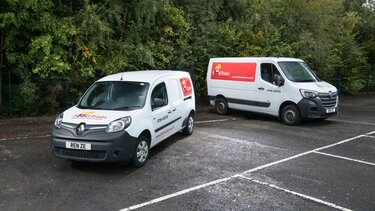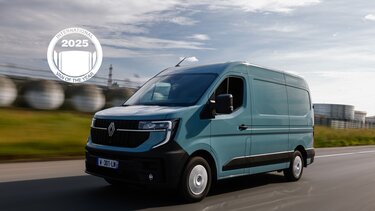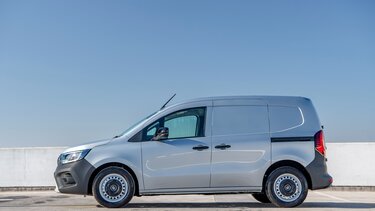With the arrival of the zero-emissions-in-use Renault vans, the Food Train is now significantly extending the reach of it's invaluable service, which sees it's volunteers make hundreds of grocery deliveries each week to older people who struggle with shopping through age, ill health, frailty or disability. In addition to it's established operations in Dumfries and Galloway, West Lothian, Glasgow, Renfrewshire, Stirling, Dundee and Scottish Borders and in the latest development in it's 25-year history, the charity is now able to expand it's coverage to Clackmannanshire and East Renfrewshire.
The 100 per cent electric Renault Z.E. vans have been funded through SP Energy Networks Green Economy Fund, which is administered by the Energy Saving Trust. The fund aims to help local communities benefit from low carbon technology and support the Scottish Government’s energy strategy. As well as it's first electric vehicles, the six short-wheelbase Renault Master Z.E. and three Renault Kangoo Maxi Z.E. vans are also the very first brand new vehicles the Food Train has on it's fleet, with several replacing aged diesel vans. The availability and the amount of load space were key to the Food Train choosing the Renault Z.E. vans over electric rivals.
Switching part of it's fleet to pure electric Renault Z.E. vans has also enabled the Food Train to make it's funds go further, generating savings in terms of fuel costs and the increasingly expensive maintenance of several older vehicles.
Importantly, the change has had little impact on the effectiveness of it's complex operation, which has seen the charity make 445,000 deliveries in 2019/20 and deliver shopping that was worth over £14 million. The respective WLTP ranges of 75 and 143 miles for the Renault Master Z.E. and Renault Kangoo Maxi Z.E. have proved enough for the rounds, even though the number of drops can vary significantly.
To add extra reassurance and enable the charity to reach older people in more remote areas of Stirling, one of the Renault Kangoo Maxi Z.E. vans has been specified with the optional heat pump. Part of the air conditioning system, it produces heat or cools down the vehicle. Acting like reversible air conditioning, it operates in both capacities while preserving the driving range that is available to the Food Train’s volunteers.
Michelle Carruthers MBE, CEO of the Food Train, said:
“We are delighted that our new vans are allowing us to operate in a more environmentally friendly way and support the Scottish Government’s climate change and air quality targets. However, even without the environmental benefits they make sense for us operationally. They take the constant stopping and starting during our rounds in their stride and the Masters swallow the delivery boxes with room to spare, while the Kangoo has more than enough space for a full delivery. For most of our volunteers, most of whom are retired, the Renault Z.E. vans are their first experience of driving and charging an electric vehicle. Some were a little wary at first, but feedback has been great and they really enjoy the relaxed drive and comfort, with some also going so far as to explore the benefits of the regenerative braking system.”
Vincent Tourette, Managing Director, Groupe Renault UK, added: “It’s fantastic to see the positive impact that the Renault Master Z.E. and Renault Kangoo Z.E. are having on the Food Train and the older people it helps. It’s another excellent illustration of how usable the all-electric Renault PRO+ range is and how it can allow organisations to enjoy environmental and financial benefits with no detriment to their everyday operations, whether they are working in urban or more remote regions.”
Discover more about the Renault PRO+ E-Tech 100% electric range.







